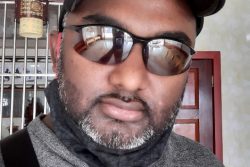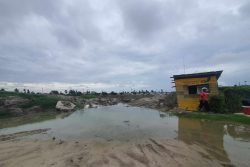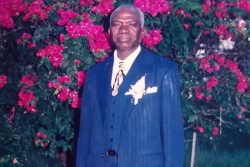Dear Editor,
The turbulence through which the Guyana Police Force is currently passing was to be expected. Its genesis springs from the current phase of democratization sweeping through the nation following the failed attempt by the APNU+AFC to return to government by fraudulent means. Inherent in any democratization process will be apparent contradictions and missteps that will, for one reason or another, attract criticism from those who feel a sense of disappointment because of perceived unfulfilled promises, the slow pace of the trickle-down effect, the complexities of the transformative process or the slavish adherence to the adage; ‘The more things change the more they remain the same.’ With the winds of change from one administration to another, comparisons will be made as regards the form and content of governance at the State and government levels. And with an electorate almost evenly divided, win or lose by narrow margins, will cause comparative analysis to be made that tend to blur or taint reality today or what existed yesterday.
Judgement calls will be made about the performance of government departments and agencies. The upper echelons of government will be criticized for one reason or another. Allegations of political interference in Constitutional bodies will be fast and furious. Not even the heads of those institutions will be spared. Sections of the media will keep up the pressure on government. But notwithstanding all the noise, and allegations and accusations flying left, right and center, there is one saving grace in which we can all seek comfort, that is the parliamentary democracy we have with its inherent checks and balances and, under whatever we see and hear is accommodated. The Guyana Police Force will be no exception to the impact of the transition from one administration to another, though it is the class nature of the administration that really matters. The Force is neither insulated from, nor immune to the winds of change. And, all things being equal, it will be subjected to harsh judgement and scrutiny by those who once strutted the corridors of power. Small wonder why cries claiming the Force has been ‘weaponized’ and loose talk about a ‘parallel force’ being created can be heard from the mouths of those who once praised the Guyana Police Force.
The GPF has a special carve out in Guyanese society. Its role and place inter alia is; ‘To ensure the maintenance of public order and safety throughout Guyana…’ Police forces represent the coercive arm of the state. They have been established to quell acts of civil disobedience, violent disruptions of the peace and good order, economic sabotage, illegal financial transactions, to regulate traffic and to prevent and investigate crime. Under conditions of a dictatorship, the police is used oppress, suppress, spy on political opponents, tap telephone conversations, intercept mail and hack Facebook accounts. Dictatorial regimes promulgate national security acts and emergency laws that empower the police to arrest and detain persons with impunity. They are held responsible for the disappearance and murder of journalists, newspaper editors, human rights activists, professionals, university lecturers and students, trade unionists and even religious leaders. We only have to reflect on the experiences of the 1970 to 1980 period in Chile, Argentina, Uruguay, Bolivia and Paraguay to name a few in Latin America and South Africa to recall the times when police/military dictatorships unleashed reigns of terror on their own population in the absence of democracy in any shape or form.
We in Guyana have had our taste of these experiences under the Burnham dictatorship, perhaps not to the extent as was manifested in Latin America and in Haiti under Duvalier and in Grenada under Gairy. Nevertheless, the point must be made that politicization within the police force began soon after the PNC assumed office in 1964. With its assumption to office, every effort was made to create a force with a leadership that was obliged to respond to the beck and call of Burnham’s whims and fancies. Police ranks were compelled to sell ‘The New Nation’, official organ of the PNC and raffle tickets as party fund raisers. Senior ranks were coerced into attending Congresses and General Council meetings of the PNC. Many were pressed to work on weekends at Burnham’s farm at Hope Estate on the East Coast. Promotions and appointments of Commissioners were solely on the basis of godfatherism and favouritism that was rampant in the promotion system. According to one source: ‘The merit principle was seldom applied. Many ranks belittled and degraded themselves in order to find favour with an officer in the hope that they would be recommended for promotion.’
During the 2015 to mid-2020 period, the APNU+AFC coalition administration sought to do as Burnham did, to remodel the GPF in their own image and sought to use it to advance their nefarious and anti-popular political agenda. Regrettably, there were some in the Force who were so weak and spineless that they chose to surrender their professionalism, abandon the lofty standards of the Force and placed their experience and knowledge at the service of the APNU+AFC. This was manifested in so many ways, so much so that disgruntlement and demotivation among ranks became widespread. Sources say that were the APNU+AFC to remain in office for another five years there could have been rebellion by ranks in the GPF. With the change of government in August of 2020, the GPF was, logically, caught up in the fresh winds of change, thus the positive turmoil we are now witnessing at Eve Leary. Thus what the GPF is experiencing currently is the birth pangs of a new leadership that is about to emerge. But like the birthing of any new phenomenon a struggle will occur. That struggle is manifested in resistance by the Slowites to block a new leadership of the GPF from emerging. This is the sum total of what’s behind the turbulence and upheaval currently affecting the GPF. However, it is necessary if change is to come.
Sincerely,
Clement J. Rohee
Former Minister of Home Affairs






